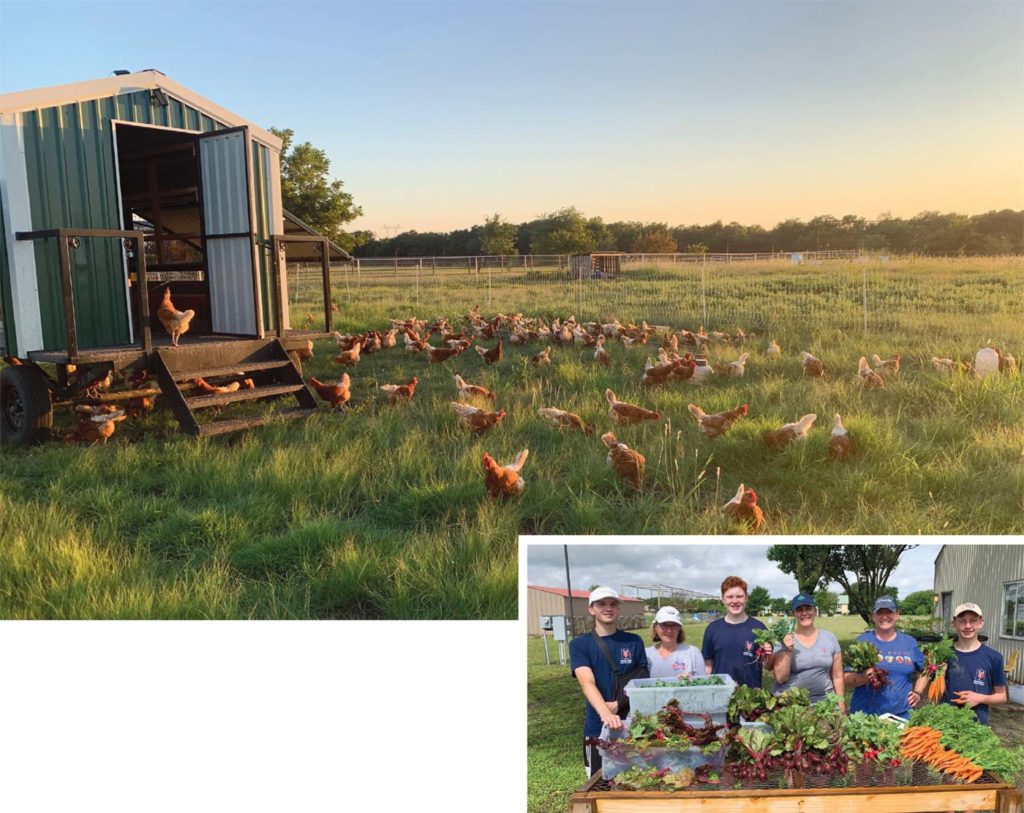Photography: Hilaire Baumgartner and Elizabeth Nickols
Many generous local growers dedicate themselves to feeding hungry neighbors. Here we’ve highlighted two with a passion for giving – the first a solo urban flower and produce farmer, and the other a growing nonprofit farm that is now feeding many. Both are uplifting stories of growth and inspiration!

FORT WORTH FARM COMPANY
A stone’s throw from Northwest Tarrant County’s two major lakes, Marine Creek and Eagle Mountain, you will find organic, seasonal flowers and produce grown by Addie Baker.
Addie can be found seeding, sowing or harvesting her quarter-acre field just about any day, any time. The modest field is intensively cultivated to maximize space for all that she grows, including pumpkins, chard, tomatoes, cantaloupe, carrots, basil, peppers, flowers and much more. The field is also home to chickens, their baby chicks and head honcho rooster, Jerry.
Addie’s passion for gardening and growing blossomed into Fort Worth Farm Company, with a goal of providing high-quality produce to members of the community who need it the most. Using proceeds from her fresh-cut flower subscriptions, Addie can donate the produce she grows to the local food bank, churches and shelters. “I wanted to use the skills and garden space I have to serve my community,” Addie says. “The plan is to make a business from my cut flowers and then be able to share all of the produce I grow.”
To fill her seasonal fl oral subscription jars, custom arrangements, and the ever-popular “flowers by the bucket,” Addie mindfully curates a unique blend of heirloom blooms. Residents and businesses in the Fort Worth area benefit from the beauty of her arrangements and secondarily benefit by helping feed the local community with freshly grown food.
- The next batch of flower subscriptions will be ready in spring 2022. For exact updates and more information, reach out to fortworthfarm.com or follow Addie on instagram @fortworthfarmcompany.

MCKINNEY ROOTS
On the site of a former baseball field in northwest McKinney, something good is growing on. In the spring of 2020, facing an increasing need to provide fresh produce to food-insecure families, McKinney Roots, a donation garden, merged into an initiative of the nonprofit Seed Project Foundation.
Utilizing a one-acre plot that expanded to five acres (with an all-volunteer effort), McKinney Roots was able to grow, harvest and donate 5,000 pounds of produce in 2020, including tomatoes, cucumbers, squash, cantaloupe, sweet potatoes and herbs. Executive Director Vicki Deerman knew that as their mission expanded, “we’ve got to hire a full-time farmer and give away eggs.”
In January 2021, they brought on Tucker Nickols, and with guidance from Cartermere Farms, a portable chicken coop was built – a chicken tractor with nesting boxes on the outside, that make it efficient to gather eggs. A good-size flock of 160 laying hens came next. Rotating them through growing areas, gives them access to interesting and new forage while distributing their manure across the pasture. Sunny joined the team, a friendly livestock guardian dog.
Right now, the hens are laying 150 eggs per day. With the help of volunteers, eggs and produce are harvested, sorted and distributed to local nonprofits, providing for about 300 people every week. “We’re all about feeding people and educating the community,” Nickols says. “People want to be part of what we’re doing, and one of our biggest learning curves was how to manage volunteers – we’re always moving towards a full-production farm but want to stay focused on the education component. We don’t want a desire for efficiency to get in the way of teaching people the value of getting their hands in the ground, being part of a planting or harvesting crew and experiencing how food grows. We had some moms who’d never seen a carrot growing, and they were impacted.”
Produce not donated (overripe or damaged) becomes chicken food or returns to the soil through composting, and broken eggs are lapped up by Sunny, efficiently closing the energy cycle. Everything gets used. The team follows ecological practices and continues to fine-tune the diversity of nutrient-dense produce they grow.
By the end of the year, they plan on building a hydroponic greenhouse to add a substantial crop of lettuce every week. “Growing on a previous ball field, I like to say we’ve got chickens in the outfield, a greenhouse in the batting cage, carrots on third base, okra on first base … and compost at home plate,” Nickols says, chuckling. There’s no doubt that McKinney Roots is a home run.
- Food insecurity ranks high in Collin County (2nd highest in DFW), and even a small recurring donation to McKinney Roots goes far to feed a family. Get involved by volunteering, donate funds to keep things growing and keep people nourished, and get updates by subscribing to the newsletter: mckinneyroots.org
Blog: Baumass Foods - Hilaire Baumgartner inspires families to eat more plant-forward food through her recipes at Baumassfoods.com. Also find her on Instagram and Facebook @BaumassFoods.
-
Hilaire Baumgartnerhttps://www.edibledfw.com/author/hilairebaumgartner/
Maria Whitworth is Director of Communications for Council for Healthy Food Systems, a non-prot org providing educational workshops for small farmers, giving them the business and marketing skills needed to tap into the growing demand for locally raised, pastured meats, poultry and eggs. HealthyFoodSystems.org
-
Maria Whitworthhttps://www.edibledfw.com/author/mariawhitworth/
-
Maria Whitworthhttps://www.edibledfw.com/author/mariawhitworth/
-
Maria Whitworthhttps://www.edibledfw.com/author/mariawhitworth/
-
Maria Whitworthhttps://www.edibledfw.com/author/mariawhitworth/









